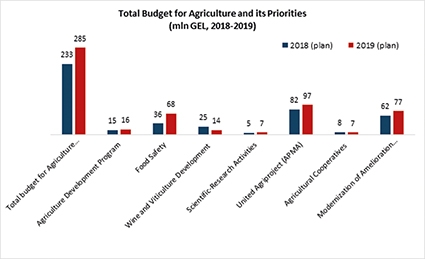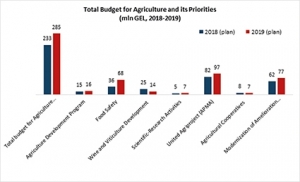November Agri Review: The Sector at a Glance
The state budget for 2019 is currently being discussed in Parliament and must be approved by the end of the year. According to the revised version (second version), the total budget will be around 13 billion GEL, out of which the Ministry of Environmental Protection and Agriculture (MEPA) will get 332 million GEL (2.4% of the total budget). Approximately 285 million GEL will go to agriculture development and the remaining 47 million GEL will be spent on environmental protection.
Compared to 2018, the budget for agriculture development will increase by around 22% in 2019. More state funds will be allocated to most of the agricultural areas except for development of the wine and viticulture sector and development of agricultural cooperatives. In 2019, these two areas will have a lower budget than they had in 2018.
As in previous years, the biggest share of state funds goes to further support the Agricultural Projects Management Agency (APMA) and the modernization of amelioration systems. It should be noted that in 2019, APMA will finance 10 types of projects including 4 new ones. These new projects are: farmer/farm registration, “Imereti Agrizone”, “Reap the Harvest” and a project on technical support and marketing. Specifically, “Imereti Agrizone” aims to create a greenhouse cluster in Imereti, while “Reap the Harvest” will support farmers in purchasing harvesting equipment.
DOMESTIC PRICES
Month-on-month prices did not change in the category of food and non-alcoholic beverages. From an annual perspective (October 2018 vs. October 2017), prices of food and non-alcoholic beverages increased slightly by 0.2%. On an annual basis, the sharpest price decreases were observed in the fruit and grapes sub-category for tangerines (-41%), lemons (-33%), apples (-28%), pears (-25%), plums (-24%) and grapes (-15%). In October 2018, prices for grapes dropped by 15% compared to October 2017 due to a good harvest in 2018. According to LEPL National Wine Agency, this year more than 230,000 tons of grapes have been processed; that is 72% higher than the previous year (134,000 tons).
Positive trends in grape production obviously affected the wine sector. During January-October, 2018, Georgia exported 68.3 mln bottles (0.75 liter) of wine, which was 12% higher than the same indicator in the previous year. As shown in the diagram, on an annual basis, Georgian wine export to Russia increased by 10%, while exports to Ukraine, Kazakhstan and Poland increased by 34%, 16% and 30% respectively. Meanwhile, Georgian wine exports to China declined by 11%.
In order to support the development of the Georgian wine sector and the international reputation of Georgian wine, on November 6, 2018, the Government of Georgia adopted technical regulations for wine production that determine general rules, permitted processes, inputs and substances for wine producers. Among other things, the regulation forbids the addition of water into wine and defines the physical-chemical characteristics, sugar content, acrylic acidity, and mass concentration of non-sugar extract in wine.
INTERNATIONAL PRICES
As international prices, international prices decreased in October 2018. The Food Price Index, measured by the Food and Agriculture Organization (FAO), decreased by 7.4% in September 2018, compared to the previous year.
INTERNEATIONAL TRADE
During October 2018, Georgia’s agricultural exports (including food) amounted to 64 mln. USD, which is almost 30% of total Georgian export value. While comparing this indicator to October 2017, it is down by 1 percentage point. As for imports, in October 2018, Georgia’s agro imports reached 103 mln USD, which constitutes 16% of total Georgian imports. Year over year (compared to October 2017), agricultural imports declined slightly by more than 1%.
POLICY WATCH
New fruit processing factory opened in Shida Kartli
A modern fruit processor was opened in the village of Sogholasheni in Kareli municipality with state support. The total investment amounts to more than 1 mln. GEL, out of which 60% is funded by donors and 40% comes from a cheap agricultural loans project supported by the state.
New 5-year USAID Agriculture Program
The United States Agency for International Development (USAID) is launching a new program to support agricultural business development in Georgia’s western city of Kutaisi. The program aims to create 3000 new jobs in Georgia.











